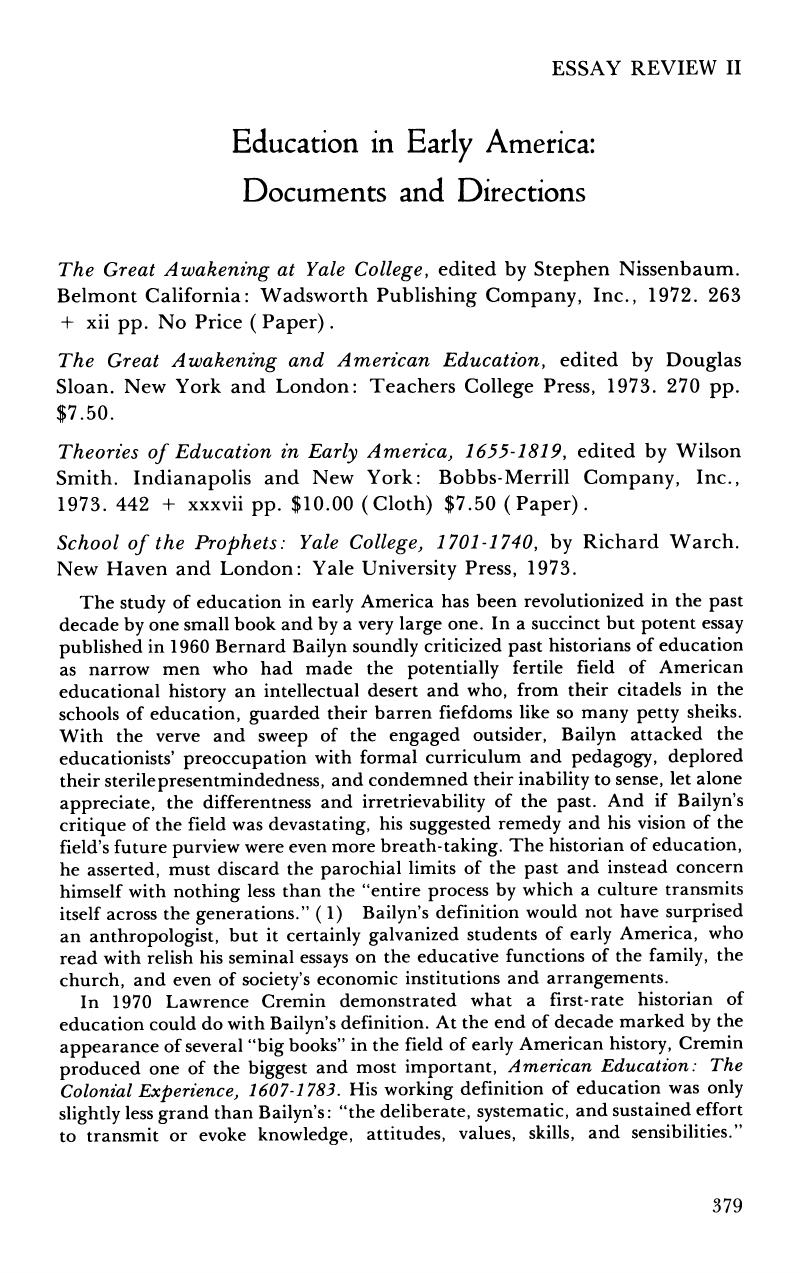Published online by Cambridge University Press: 24 February 2017

1. Bailyn, Bernard, Education in the Forming of American Society (Chapel Hill, N. C., 1960, p. 14.Google Scholar
2. Cremin, Lawrence A., American Education: The Colonial Experience, 1607–1783 (New York, 1970), pp. xi, xiii.Google Scholar
3. Greene, Jack P., “The Development of Early American Culture,” Reviews in American History, 1 (June, 1973): 184.Google Scholar
4. Smith, Samuel Harrison, “Remarks on Education …”, in Rudolph, Frederick, ed., Essays on Education in the Early Republic (Cambridge, Mass., 1965), p. 172.Google Scholar
5. Jencks, Christopher, et al, Inequality: A Reassessment of the Effect of Family and Schooling in America (New York, 1972).Google Scholar
6. See, especially, Pilcher, George W., Samuel Davies: Apostle of Dissent in Colonial Virginia (Knoxville, Tenn., 1971).Google Scholar
7. Beales, Ross, review of Nissenbaum, , The Great Awakening at Yale College , in The William and Mary Quarterly, 3rd ser., 30 (July, 1973): 530–531.Google Scholar
8. The Declaration of the Rector and Tutors of Yale College in New-Haven, Against the Reverend Mr. George Whitefield, His Principles and Designs. In a Letter to Him (Boston, 1745).Google Scholar
9. See, especially, Chapter 6 of Warch, and Foster, Margery S., “Out of Smalle Beginnings …” An Economic History of Harvard College in the Puritan Period (1636 to 1712) (Cambridge, Mass., 1962).Google Scholar
10. The chapter should be read in conjunction with Harris, P.M.G., “The Social Origins of American Leaders: The Demographic Foundations,” Perspectives in American History, 3 (1969): 159–344.Google Scholar
11. Veysey, Laurence R., “Toward a New Direction in Educational History: Prospect and Retrospect,” History of Education Quarterly, 9 (Fall, 1969): 343–359.CrossRefGoogle Scholar
12. See especially Demos, John, A Little Commonwealth: Family Life in Plymouth Colony (New York, 1970); Greven, Philip J. Jr., Four Generations: Population, Land and Family in Colonial Andover (Ithaca, New York, 1970); Lockridge, Kenneth A., A New England Town: The First Hundred Years. Dedham, Massachusetts, 1636–1736 (New York, 1970); and Zuckerman, Michael, Peaceable Kingdoms: New England Towns in the Eighteenth Century (New York, 1970).Google Scholar
13. Greene, Jack P., “The American Colonies During the First Half of the Eighteenth Century,” Reviews in American History, 1 (March, 1973): 69–75.Google Scholar
14. The most stimulating of those speculations thus far have been advanced by Professor Murrin, John M. See especially his paper presented at the April, 1974 convention of the Organization of American Historians, “Anglicization and Identity: The Colonial Experience, the Revolution, and the Dilemma of American Nationalism.” Google Scholar